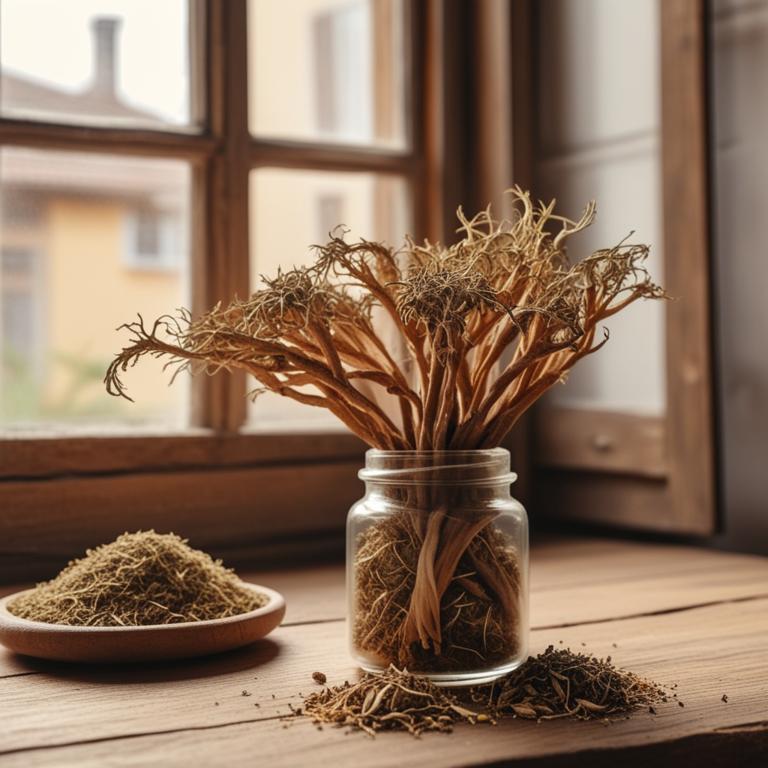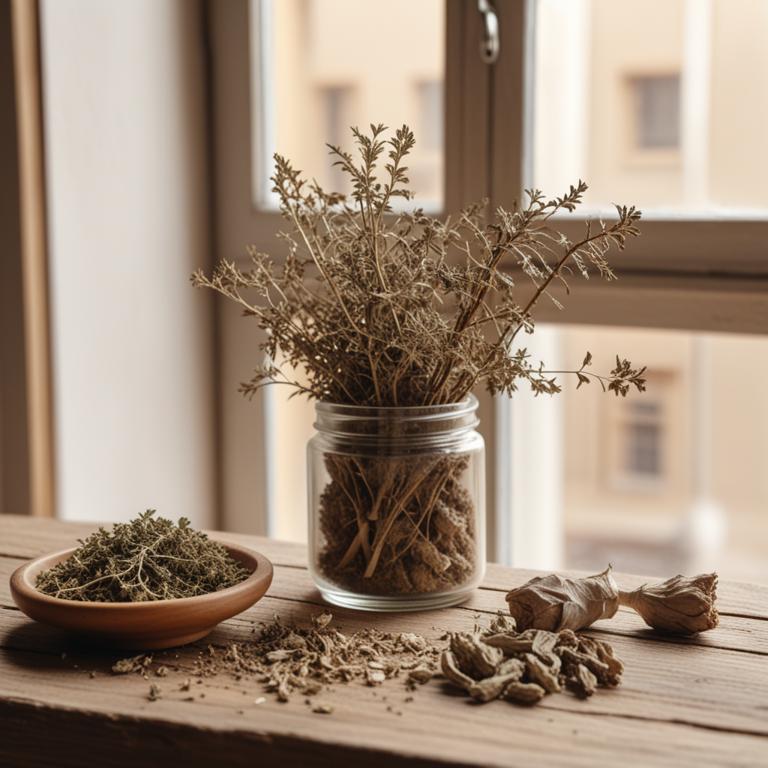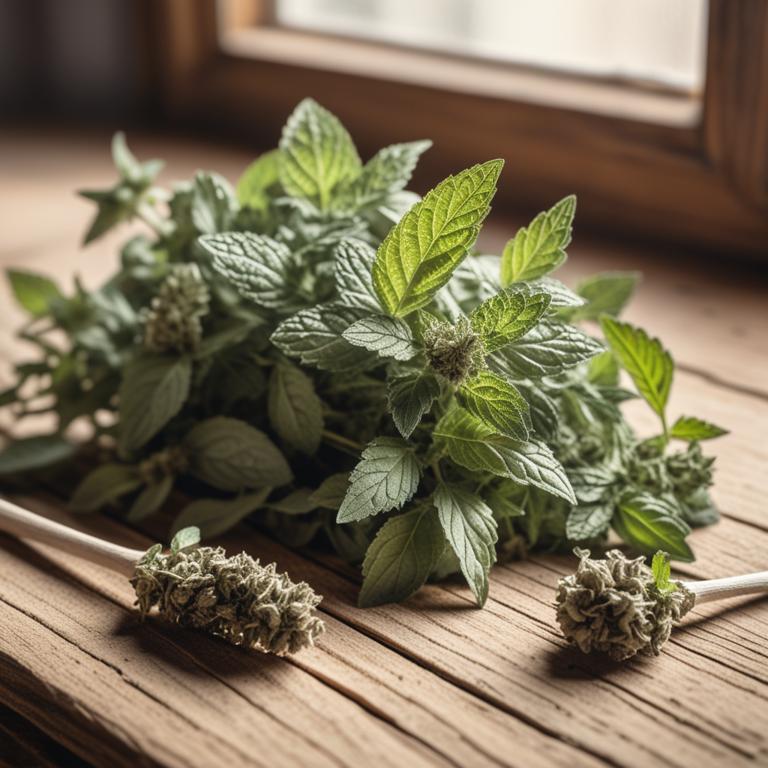Updated: Dec 1, 2024
Gastroparesis Natural Treatment: Causes and Medicinal Herbs for Relief

Gastroparesis is a condition where the stomach muscles weaken, causing food to move slowly or not at all.
This can lead to uncomfortable symptoms like nausea, vomiting, and bloating. For those who suffer from gastroparesis, everyday activities like eating and digesting food can become a challenge. Gastroparesis can be caused by a variety of factors, including diabetes, certain medications, and even viral infections. Some people may also experience gastroparesis after surgery or due to an underlying neurological condition. Herbal remedies can provide relief for those affected by gastroparesis.
Herbs like ginger, peppermint, and fennel have natural digestive properties that can help ease nausea and discomfort. These herbs can be consumed in various forms, such as teas, capsules, or even added to food. Ginger tea, for example, can be made by steeping fresh ginger in hot water. This warm, soothing drink can help calm the stomach and alleviate nausea. Peppermint tea, on the other hand, can be enjoyed as a refreshing beverage that also helps to relax the digestive system. Fennel tea, often consumed after meals, can aid in digestion and reduce bloating.
By incorporating these herbal remedies into your diet, you may find some relief from the symptoms of gastroparesis and improve your overall well-being.
Table of Contents
- What are the root causes of gastroparesis?
- What benefits can herbs offer for people with gastroparesis?
- What herbs are commonly used to alleviate symptoms of gastroparesis?
- What are the most frequently prescribed herbal preparations for gastroparesis?
- Which herbs should you avoid consuming if you have gastroparesis?
- FAQ
What are the root causes of gastroparesis?
The main causes of gastroparesis are a combination of various factors that affect the normal functioning of the stomach muscles.
One of the main causes is diabetes, specifically type 1 diabetes or poorly controlled type 2 diabetes. When diabetes damages the nerves that control the stomach muscles, it can lead to gastroparesis. This is because the nerves help regulate the movement of food through the digestive system, and when they're damaged, food can't move properly. Alcoholism is another significant cause of gastroparesis. Drinking excessive amounts of alcohol can damage the nerves and muscles in the stomach, leading to gastroparesis.
This is because alcohol can cause inflammation and scarring in the stomach lining, which can disrupt the normal functioning of the stomach muscles. Neurological disorders, such as Parkinson's disease, multiple sclerosis, and peripheral neuropathy, can also cause gastroparesis. These conditions damage the nerves that control the stomach muscles, leading to gastroparesis. For example, in Parkinson's disease, the damage to the nerves can cause the stomach muscles to become weak and unable to move food properly. Hypothyroidism, a condition where the thyroid gland doesn't produce enough hormones, can also lead to gastroparesis. When the thyroid gland is underactive, it can affect the nerves and muscles in the stomach, leading to gastroparesis.
This is because the thyroid hormones play a crucial role in regulating the nerves and muscles that control the digestive system.
What benefits can herbs offer for people with gastroparesis?
Using herbs to manage gastroparesis can bring relief to those affected.
One of the main benefits is improved digestion, as these herbs can help stimulate the stomach to move food along and prevent backups. This can lead to reduced nausea and vomiting, allowing for better nutrient absorption and a decrease in symptoms like bloating and abdominal pain.
Some herbs may also help to relax the stomach muscles, which can become tense and contribute to gastroparesis symptoms. Furthermore, certain herbs have anti-inflammatory properties, which can help reduce inflammation in the digestive tract and promote healing. Additionally, these herbs can help regulate blood sugar levels, which is particularly important for people with gastroparesis, as they may be more prone to blood sugar imbalances.
By using herbs, individuals with gastroparesis may be able to manage their symptoms more effectively and improve their quality of life.
What herbs are commonly used to alleviate symptoms of gastroparesis?

Gastroparesis is a condition where the stomach takes too long to empty its contents.
This can lead to uncomfortable symptoms like nausea, vomiting, and bloating. Herbs can be a helpful addition to treatment, as they can ease symptoms and improve digestion. One herb that can help is ginger, Zingiber officinale. It's known for its anti-inflammatory properties and can help reduce nausea and vomiting. It also has natural antispasmodic properties, which can help relax the stomach muscles and improve digestion.
Another herb that can be beneficial is fennel, Foeniculum vulgare. It contains compounds that can help relax the stomach and intestines, reducing symptoms like bloating and discomfort. Cinnamon, Cinnamomum verum, has natural antispasmodic properties as well, which can help ease cramps and spasms in the stomach. Licorice root, Glycyrrhiza glabra, has anti-inflammatory properties and can help soothe the stomach lining. It also has natural laxative properties, which can help prevent constipation, a common issue for people with gastroparesis. Finally, fenugreek, Trigonella foenum-graecum, contains compounds that can help stimulate digestion and improve the movement of food through the digestive system.
All of these herbs can be used in teas, supplements, or added to food to help manage gastroparesis symptoms.
What are the most frequently prescribed herbal preparations for gastroparesis?

Herbal preparations can be helpful for people with gastroparesis, a condition where the stomach takes too long to empty its contents.
Some herbal preparations that may help are tinctures, decoctions, infusions, capsules, and gel capsules. Tinctures are liquid herbal extracts that can be taken in small amounts. They can be made with herbs like ginger and peppermint, which are known to help with digestion. Tinctures are easy to take and can be added to water or food. Decoctions are strong herbal infusions made by boiling herbs in water. They can be made with herbs like licorice root and slippery elm, which have anti-inflammatory properties that may help soothe the stomach. Decoctions are a good option for people who have trouble digesting herbs in other forms. Infusions are similar to teas, but they are made with a higher ratio of herbs to water.
They can be made with herbs like chamomile and fennel, which are known to help with digestion and reduce nausea. Infusions are a good option for people who want a mild and easy-to-digest herbal preparation. Capsules are small, gelatin or vegetable-based packets that contain powdered herbs. They can be made with herbs like ginger and peppermint, which are known to help with digestion. Capsules are a good option for people who have trouble swallowing large amounts of liquid or who want a convenient way to take herbs on the go. Gel capsules are similar to regular capsules, but they are filled with a gel-like substance that is made from the herb. They can be made with herbs like aloe vera and slippery elm, which have anti-inflammatory properties that may help soothe the stomach. Gel capsules are a good option for people who want a gentle and easy-to-digest herbal preparation.
These herbal preparations can be taken separately or in combination with other treatments, and it's always a good idea to talk to a healthcare provider before trying any new remedies.
Additional Resources:
Which herbs should you avoid consuming if you have gastroparesis?
If you have gastroparesis, it's best to limit your use of certain herbs.
For instance, Piper nigrum, or black pepper, can irritate your stomach lining even more, making your symptoms worse. This is because it contains compounds that increase stomach acid production and can slow down digestion. Similarly, Capsicum annuum, commonly known as chili peppers, can also be problematic due to its spicy and irritating nature.
It can further slow down digestion and make it harder for your body to break down food. Cuminum cyminum, or cumin, has a similar effect, as it can stimulate stomach acid production and cause discomfort. Aristolochia clematitis, also known as birthwort, is not recommended for people with gastroparesis because it can cause stomach ulcers and make your condition worse. Silybum marianum, or milk thistle, is often used to treat liver problems, but it can also cause stomach upset and slow down digestion, which is not suitable for individuals with gastroparesis.
These herbs can exacerbate the condition by irritating the stomach lining, increasing acid production, or slowing down digestion, making it essential to use them with caution or avoid them altogether.
FAQ
Are there any specific herbs that can prevent gastroparesis?
Some research suggests that certain herbs like ginger and peppermint may help alleviate gastroparesis symptoms.
Ginger's anti-inflammatory properties may soothe the stomach, while peppermint's calming effects can ease digestive issues. However, more studies are needed to confirm their effectiveness.
These herbs are commonly used in traditional remedies and may provide some relief for affected individuals.
Is it safe to use herbal remedies for gastroparesis during pregnancy?
It's not recommended to use herbal remedies for gastroparesis during pregnancy.
Some herbs can harm the fetus or cause pregnancy complications. For example, peppermint oil can relax the stomach muscles too much, and ginger can cause bleeding or interact with other medications.
Stick to what your body needs during pregnancy.
Are there any herbs that can reduce the frequency of gastroparesis?
Ginger has been studied for its potential to help manage gastroparesis symptoms.
Research suggests it may help ease nausea and vomiting by stimulating digestion. Some people also find relief with peppermint, which can relax the muscles in the stomach and improve digestion.
These herbs may help reduce gastroparesis frequency, but more research is needed.
Can i combine different herbal remedies for gastroparesis?
You can try combining different herbal remedies for gastroparesis, but be cautious.
Some herbs might interact with each other or with medications. For example, ginger and peppermint can help with digestion, while licorice root and slippery elm may soothe the stomach lining.
Experiment with small amounts to see what works for you.
Related Articles

Ulcerative Colitis: Investigating the Role of Medicinal Herbs and Preparations

Understanding Gastroenteritis: Causes, Medicinal Herbs, and Herbal Preparations

Stomach Growling: Understanding Causes, Prevention, and Herbal Remedies

Herbal Relief for Upset Stomach: Causes, Medicinal Herbs, and Preparations

The Causes and Herbal Preparations of Stomach Discomfort






